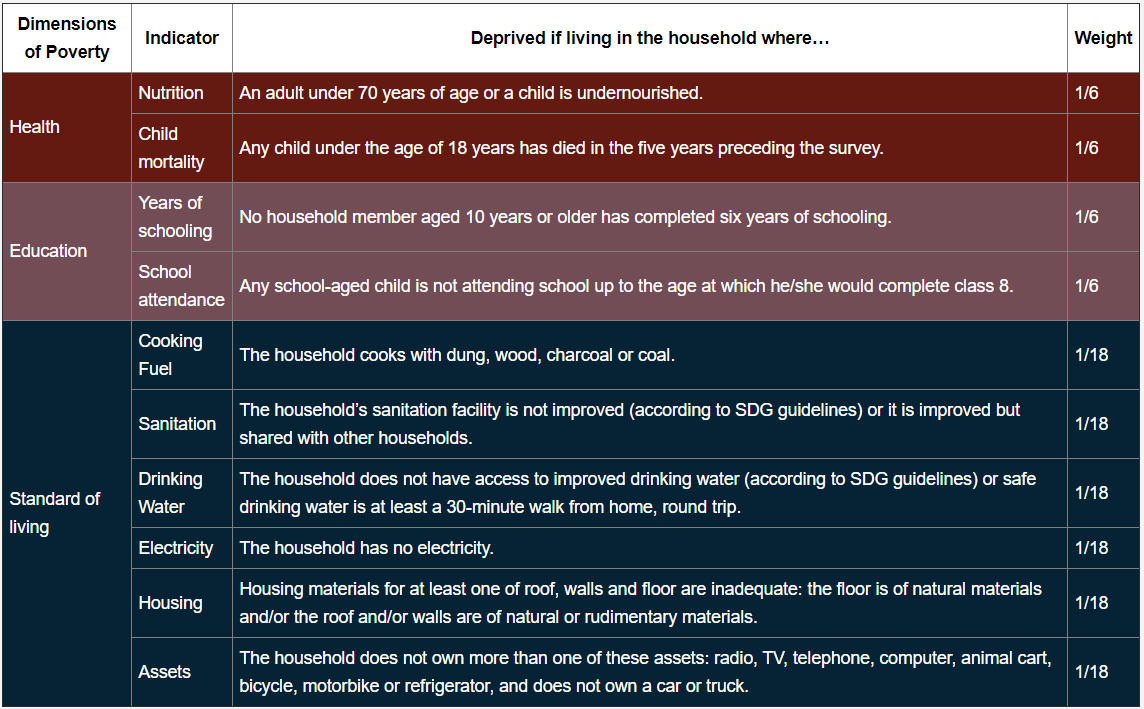Ahmedabad
(Head Office)Address : 506, 3rd EYE THREE (III), Opp. Induben Khakhrawala, Girish Cold Drink Cross Road, CG Road, Navrangpura, Ahmedabad, 380009.
Mobile : 8469231587 / 9586028957
Telephone : 079-40098991
E-mail: dics.upsc@gmail.com

Global Multidimensional Poverty Index
News: According to Global MPI 2023, India registered a remarkable reduction in poverty with 415 million people coming out of it in 15 years from 2005/2006 to 2019/2021.
What is Global Multidimensional Poverty Index?
• The multidimensional poverty index (MPI) is a measure of poverty that captures the multiple deprivations that poor people face in health, education and standard of living.
| The MPI is calculated by multiplying the incidence of poverty and the average intensity of poverty. |
• The MPI 2023 is the latest update of the global MPI, which covers 110 developing countries and 6.1 billion people, accounting for 92 percent of the population in developing countries.
• The report, titled “Unstacking global poverty: Data for high-impact action”, was launched on July 11, 2023 by the UNDP and the OPHI at the University of Oxford.
How does it measure multidimensional poverty?
• By constructing a deprivation profile for each household and person across 10 indicators spanning health, education and standard of living.
• A person is multidimensionally poor if s/he is deprived in one-third/33% or more of the weighted indicators out of the 10 indicators.
• Those who are deprived of one-half or more of the weighted indicators are considered living in extreme multidimensional poverty.
Key Findings:
• The report reveals that 25 countries halved multidimensional poverty within 15 years, but 1.1 billion people remain poor of the 6.1 billion people covered by the report.
• The report also shows that 534 million of the 1.1 billion poor people live in Sub-Saharan Africa, 485 million poor people live in severe poverty, and 566 million of the 1.1 billion poor people are children under 18 years of age.
• The report highlights the achievements and challenges of different countries and regions in reducing multidimensional poverty.
• For example, India registered a remarkable reduction in poverty with 415 million people coming out of it in 15 years from 2005/2006 to 2019/20214. Cambodia also reduced its MPI value by more than half from 2014 to 2021/2022.
• As far as India is concerned, deprivation declined in all sectors. The poorest states and groups, including children and people in disadvantaged caste groups, had the fastest absolute progress.
What are the concerns raised?
• Child poverty is a pressing issue. The issue will only exacerbate when negative impacts of Covid pandemic will be taken into account. The lack of comprehensive data during the pandemic is in itself an issue.
• Poverty is visible more in rural areas with 84% of all poor people living in rural areas.
Way Forward
• The findings of the report indicate that poverty reduction is achievable, demonstrating the feasibility of the SDG target 1 – ending poverty in all its forms everywhere by 2030.

Address : 506, 3rd EYE THREE (III), Opp. Induben Khakhrawala, Girish Cold Drink Cross Road, CG Road, Navrangpura, Ahmedabad, 380009.
Mobile : 8469231587 / 9586028957
Telephone : 079-40098991
E-mail: dics.upsc@gmail.com
Address: A-306, The Landmark, Urjanagar-1, Opp. Spicy Street, Kudasan – Por Road, Kudasan, Gandhinagar – 382421
Mobile : 9723832444 / 9723932444
E-mail: dics.gnagar@gmail.com
Address: 2nd Floor, 9 Shivali Society, L&T Circle, opp. Ratri Bazar, Karelibaugh, Vadodara, 390018
Mobile : 9725692037 / 9725692054
E-mail: dics.vadodara@gmail.com
Address: 403, Raj Victoria, Opp. Pal Walkway, Near Galaxy Circle, Pal, Surat-394510
Mobile : 8401031583 / 8401031587
E-mail: dics.surat@gmail.com
Address: 303,305 K 158 Complex Above Magson, Sindhubhavan Road Ahmedabad-380059
Mobile : 9974751177 / 8469231587
E-mail: dicssbr@gmail.com
Address: 57/17, 2nd Floor, Old Rajinder Nagar Market, Bada Bazaar Marg, Delhi-60
Mobile : 9104830862 / 9104830865
E-mail: dics.newdelhi@gmail.com